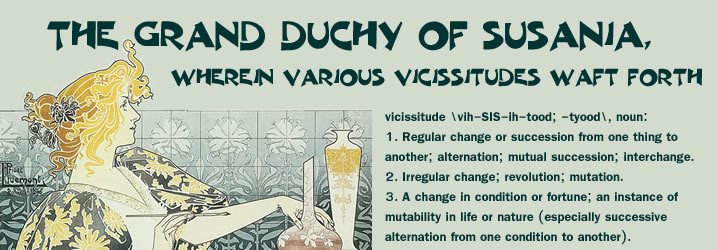I drove home listening to Bob Davis on KSTP; he was revisiting one of his favorite topics, one that mirrors exactly something I’ve felt for some time: the lack of any prominent cultural direction, and the strange incoherent sense of anticipation that lack produces. It’s as if the culture is treading water, with nothing truly new to give it focus and purpose. That’s not exactly a good thing when you’re competing with cultures that have both, in large quantities, and a sense of historical momentum the West has lost. I grapple with this from time to time, usually in the morning; it’s the odd suspicion that the West is exhausted. Not done or over or dead or resigned, but simply exhausted. We live in the end stages of the application of the Enlightenment, at least as applied to our own culture; what now? If you’ve ended debate on the great issues, you’re left with smaller ones, like 720 vs. 1080i; you concern yourself with indistinct dreads and assign to them a moral component; you luxuriate in the hot springs of partisan politics and redefine the issues so the gap between left and right looks like Gog v. Magog territory.
We're due for a societal upheaval, based on the rise and fall of world history - some catastrophic event, some crucible like the French Revolution or the Great Depression/WWII to remake our flabby, selfish, bored society. We're due for a revolution; what shape or form it will take I cannot guess, although terrorism looks to be a likely player. I almost wish it would hurry up and be done soon... I'm tired of such abject cynicism. It's an ugly world and I'd like for some sense of hope or joy to return. (Why do I think this? Read The Fourth Turning by Strauss & Howe. Plus my beloved Dean Simmons and my history degree. I think about this stuff a lot.)
In a related topic: I've been re-watching the A History of Britain series, written & hosted by Simon Schama, and reading History in English Words by Owen Barfield, and had an epiphany. England has been overrun by various conquering societies so many times that the actual "Britains" are long, long gone. Romans, Scots, Picts, Goths, Visigoths, Vandals, Vikings, Saxons, Normans, and various others. They come in, they steal and/or settle, and a hundred years later another group does the same thing.
But is modern British society upset about it? No, it's pretty much been forgotten. No-one knows where they're from beyond a few hundred years; they have no real clue if they are Saxon or Celt; the historical memory has pretty much been diluted. So nobody's angry at the descendants of the invading Normans for having taken away their properties and rights ("The Normans are keeping us down!"); after all, they as Saxons had done the same thing themselves to the Angles, and so forth and so on. Slavery? pretty much everywhere. Your village got raided by the Invading Group du Jour, you were captured and sold into slavery.
So what might this mean for America? To me, it means that someday the sins of our forefathers will no longer be applied to us. In the far distant future, the dreadful years of slavery and the white man's theft of this land will simply be a fact of history, and not an ever-present reality. I'm not saying we'll forget or it will diminish in the force of its horrors, but new things will happen, and old crimes will slowly recede into the background of history. We're still so young; everything is still so fresh. Give it 500-1000 years, and we'll have new prejudices and new outrages to be angry/guilty about.


2 comments:
On small scale culture, I'm curious if the younger crowd feels the same way about whether culture is treading water. As aging adults we see how stale the "new" things actually are, but were likely just as passionate about the things that those older than us found trite and derivative 30 years ago.
What then would be the last great cultural upheaval? The 1960's? The 1920's? The industrial revolution? I wonder if people in those times really grasped what significance their era had (okay, the 60's were pretty narcissistic; they probably assumed they were ushering in a lot more change than happened.) Could our own time be looked upon 50 years from now as monumental in its cultural significance?
You are completely write about the hang-ups and prejudices issue. Once we've adequately interbred in North America is will become a non-issue. (Or at least not the issue.)
...and by write I mean right, of course.
Post a Comment